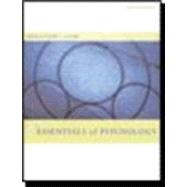
Note: Supplemental materials are not guaranteed with Rental or Used book purchases.
Purchase Benefits
What is included with this book?
| Note: Each chapter concludes with an Active Review | |
| Introduction to the Science of Psychology | |
| The World of Psychology: An Overview | |
| Approaches to the Science of Psychology | |
| Human Diversity and Psychology | |
| Thinking Critically About Psychology (or Anything Else) | |
| Research Methods in Psychology | |
| Focus on Research: Studying EMDR | |
| Linkages: Psychological Research and Behavioral | |
| Genetics Statistical Analysis of Research Results | |
| Ethical Guidelines for Psychologists | |
| Biology and Behavior Cells of the Nervous System | |
| The Peripheral Nervous System: Keeping in Touch with the World | |
| The Central Nervous System: Making Sense of the World | |
| Thinking Critically: What Can fMRI Tell Us about Behavior and Mental Processes? | |
| Focus on Research: The Case of the Disembodied Woman | |
| Linkages: Human Development and the Changing Brain | |
| The Chemistry of Behavior: Neurotransmitters | |
| The Endocrine System: Coordinating the Internal World | |
| Sensation and Perception | |
| Sensing and Perceiving the World Sensory Systems | |
| Seeing Hearing The Chemical Senses: Taste and Smell | |
| Sensing Your Body Thinking Critically: Does Acupuncture Relieve Pain? | |
| Perception Organizing the Perceptual World | |
| Recognizing the Perceptual World | |
| Linkages: Perception and Human Development Attention | |
| Focus on Research: Attention and the Brain | |
| Consciousness | |
| The Scope of Consciousness Thinking Critically: Can Subliminal Messages Change Your Behavior? | |
| Focus on Research: Subliminal Messages in Rock Music | |
| Sleeping and Dreaming Hypnosis | |
| Linkages: Meditation, Health, and Stress Psychoactive Drugs | |
| Learning Classical Conditioning: Learning Signals and Associations | |
| Instrumental and Operant Conditioning: Learning the Consequences of Behavior | |
| Linkages: Networks of Learning Cognitive Processes in Learning | |
| Focus on Research: The "I Can't Do It" Attitude Thinking Critically: Does Watching Violence on Television Make People More Violent? | |
| Using Research on Learning to Help People Learn | |
| Memory | |
| The Nature of Memory Storing New Memories | |
| Retrieving Memories | |
| Constructing Memories | |
| Focus on Research: I Could Swear I Heard It! | |
| Linkages: Memory and Perception in the Courtroom Forgetting Thinking Critically: Can Traumatic Memories Be Repressed, Then Recovered? | |
| Biological Bases of Memory Improving Your Memory | |
| Thought, Language, and Intelligence | |
| Basic Functions of Thought | |
| Mental Representations: The Ingredients of Thought | |
| Thinking Strategies Problem Solving | |
| Focus on Research: Problem-Solving Strategies in the Real World | |
| Decision Making | |
| Linkages: Group Processes in Problem Solving and Decision Making | |
| Language Testing Intelligence | |
| Evaluating Intelligence Tests | |
| Thinking Critically: Are Intelligence Tests Unfairly Biased Against Certain Groups? | |
| Diversity in Intelligence | |
| Motivation and Emotion | |
| Concepts and Theories of Motivation | |
| Eating Sexual Behavior | |
| Focus on Research: Tell Me About Your Sex Life | |
| Thinking Critically: What Shapes Sexual Orientation? | |
| Achievement Motivation Relations and Conflicts Among | |
| Motives Linkages: Conflicting Motives and Stress | |
| The Nature of Emotion | |
| Theories of Emotion | |
| Communicating Emotion | |
| Human Development | |
| Exploring Human Development Beginnings | |
| Infancy and Childhood: Cognitive Development | |
| Focus on Research: What Do Infants Know About Physics? | |
| Linkages: Development and Memory | |
| Infancy and Childhood: Social and Emotional Development | |
| Thinking Critically: Does Day Care Harm the Emotional Development of Infants? | |
| Adolescence Adu | |
| Table of Contents provided by Publisher. All Rights Reserved. |
The New copy of this book will include any supplemental materials advertised. Please check the title of the book to determine if it should include any access cards, study guides, lab manuals, CDs, etc.
The Used, Rental and eBook copies of this book are not guaranteed to include any supplemental materials. Typically, only the book itself is included. This is true even if the title states it includes any access cards, study guides, lab manuals, CDs, etc.